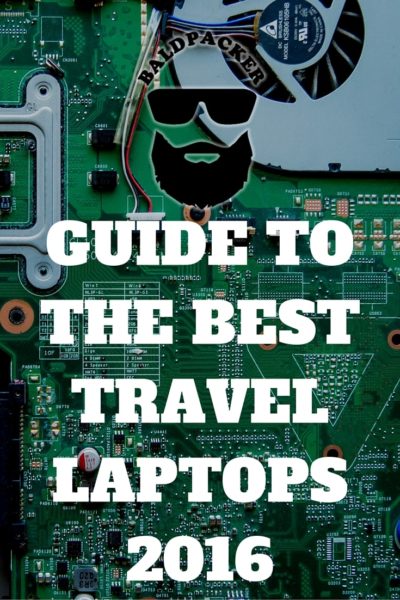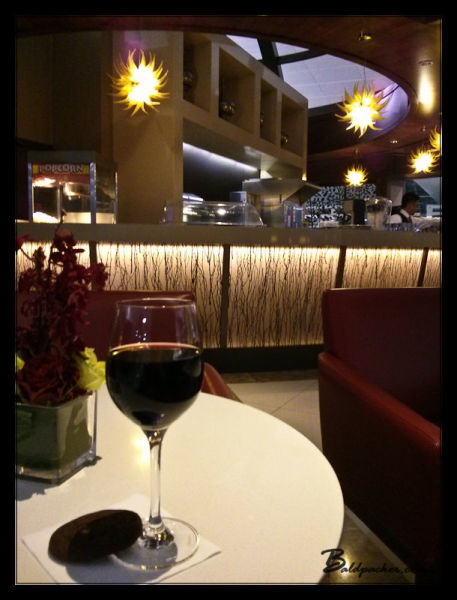Travel & Lifestyle



Selecting the best travel laptop is tough and it all comes down to performance vs. portability vs. price.
My old last laptop died last week and I spent over 30 hours researching the best travel laptops available in Q1 2016 before buying a new one.
…it all comes down to performance vs. portability vs. price
In this post I explain how I decided on the best travel laptop for me, while providing advice on what to look for in choosing the best travel laptop for you. If you just want recommendations for the best travel laptops available now, skip to the bottom.

My Goal: Freedom 35
People often tell me that my travel goals are crazy but, in many ways, my goals for early retirement are even crazier.
Being raised and educated in Canada, I was always encouraged to obtain a university education, find a secure career, claw my way up the corporate ladder, and prepare to retire 40 years later. That’s when, in theory, I would finally have time for traveling, hobbies, reading, golfing, and generally enjoying my life.
I’m not a patient person. My goal is to compress 40 years of working into less than 15 years and reach retirement (or financial independence) by the ripe age of 35.
While my Freedom 35 plan is essentially an early retirement plan, I prefer to say my goal is achieving Financial Independence since I cannot see myself as your stereotypical retiree. To me, early retirement means giving up work entirely, playing bingo Wednesday nights, seniors’ golf tournaments, and taking lots of naps.
While early retirement may be great for some, the idea of Financial Independence appeals to me far more. Let me explain why…
What is Financial Independence?
My interpretation of financial independence, or Findependence, is having sufficient personal wealth to live without having to work actively for basic necessities. In other words, I would like my assets to generate income that is greater than my expenses which will give me the benefit of CHOOSING what I do every day rather than being FORCED to work for money.
Financial independence is having sufficient personal wealth to live without having to work actively for basic necessities.
I like to challenge myself intellectually and physically on a continual basis and need to have a sense of purpose in life. Studies show that happiness is actually derived from having control over events in our lives rather than money. That is why financial independence appeals to me so much.

How to Pack a Backpack for Travel
After nearly a decade of traveling I have learned that packing small and light is the way to go; I stick to a carry-on sized backpack for the majority of trips I do now. The only time I pack more is if I am planning to camp, visit extremely cold places, or perform other “gear intensive” activities where it does not make sense to rent or borrow the equipment after arrival.
The benefits of packing small and light including not incurring additional baggage fees, being able to carry your bag on public transport, having the ability to walk great distances, and being able to live simply and travel simply without the need to worry about your stuff.
Live Simply. Travel Simply.

Airport lounges are one of the best perks available to make air travel less grueling. I actually enjoy being on a plane 36,000 feet above the worries of the world below, but hate almost everything between arriving at the airport and seeing the seat belt sign go off. I say almost because airport lounges can actually be pretty great!

Your travel backpack is essentially your home while on the road. It will contain everything that you need to live for the length of your trip. What goes into your home is obviously important, but so is the size, structure, and security. All of these considerations will apply to your backpack, just as they would a house.
Minimalism – Size of Backpack
One of the recurring themes that you will find on my blog is that less is more. The smaller your backpack, the easier it is to carry on to planes, fit into lockers, stash on buses, and maneuver through crowds. A smaller pack will also usually mean a lighter pack, saving you excess baggage costs and allowing you to carry it longer without getting tired. In my opinion, the best travel backpack for your trip will also be the smallest travel backpack that fits your needs.

Less money spent means more money saved
More money saved means the longer you can live in financial peace and security
Financial peace and security comes from owning less
Less stuff owned means less to carry around, move, or have to travel with
Less responsibility for your stuff also means less maintenance and more time
The more time you have, the more relaxed you will feel
The more relaxed you are, the less you will care about stuff
If you care less about stuff, it means you’ll care less about image
If you care less about image, you will care more about experiences and memories
If you care more about experiences and memories, you will be happier with less
If you are happier with less, you’ll never want or need for more
The less you want or need for more, the more you will feel free
This is one of my favourite passages on minimalism; it reinforces how wonderful life can be with nothing more than the possessions in your backpack.
Every time I return home to Calgary, Canada, I get caught up in the North American consumerism lifestyle. Caring about image. Wanting more. Needing more.
Consumerism is encouraged to drive the economy and keep people chained to their jobs. Don’t get me wrong, I am happy to work long hours and try to make money through an honest effort, but I think it’s important to apply that earned money to living life. To me, living is done through epic experiences, rather than the temporary thrill of a new purchase and thus time is in many ways more valuable to me than money. Rather than focus on working more hours, I try to focus on productivity and maximize the financial output from my input of time.
There are certain possessions that may lead to wonderful experiences and allow people pleasure through their hobbies: sports equipment, cars, boats, motorcycles, cookware, cameras, art supplies, and tools all come to mind, but there are also possessions that simply create more stress and less flexibility. How many kitchen gadgets does one person really need? Is a big house worth the extra time and financial cost of cleaning and maintaining?
Whenever I find myself wanting to purchase a material good, I like to read this passage and consider if the purchase will add benefit or burden to my life.
I am not sure who originally wrote this passage but if anyone knows, please leave a note in the comments so I can give the author due credit.

Travel electronics are a very difficult thing to decide whether to carry or not. On one hand, they allow for you to communicate with your friends and family back home, work or keep up with the news, and provide entertainment when the weather is poor, you’re tired, or stuck on a long bus, train or flight. On the other hand, electronics can be a hassle – weighing down your pack, giving you an excuse to stay within the comforts of home and not fully embrace the culture you’re in, and potentially stressing you out over the potential for damage or theft.
Personally, for the long-term travel that I do, I tend to carry more electronics than most people might as the benefits far outweigh the negatives for me. Yet, given my other packing sacrifices, I am still able to carry a smaller backpack than most people.
Kindle
There is a reason that the Kindle is my first listed item. I believe an e-reader is a MUST HAVE for anyone on the road. I resisted purchasing one for quite some time, but have realized that this is potentially the greatest travel item ever invented. Once upon a time, I would carry 2-3 books with me in my backpack, often weighing 5-10 pounds and susceptible to damage from wet towels or a leaky bottle. When on the road, I often like to have a travel guide, a non-fiction ‘educational’ book, and a fictional fun read. Now, these can all be condensed into a small, lightweight device. I am now able to carry hundreds of travel guides, language books, and free-reading fiction / non-fiction books and switch between each title without having to dig through my bag. Before purchasing a Kindle, I had been concerned about the battery life, and potential theft ordamage that comes with an e-reader. These days, e-readers are available for under $100, the batteries last for over a month, and they are easy to hide or secure. The one accessory many people choose to buy is a protective case with a light. I have not bought one, as I would just as soon pay $100 for a replacement Kindle as a $60 case, but the light is handy for night time reading (I use a headlamp). To help organize your books, I’d highly recommend the free software package Calibre.
Laptop
A laptop is likely the most debatable item on this list. Most hostels have computers available for use, either for free or a minimal charge, and there are many alternatives such as netbooks, tablets, or smart phones. To me, it all comes down to your requirements. I personally use my laptop for photo processing, work, blogging, e-mail, stock trading, surfing the web and the occasional movie. When I compare the size of my 14″ Laptop, to a netbook or tablet, the added versatility is well worth the few extra ounces of weight. Of course, tablets and netbooks are often quicker and easier to use, and may be preferable for some. This is really a judgement call, and will vary for each person. I prefer devices with USB ports for charging accessory devices, such as e-readers, mp3 players, and speakers, but it is also possible to buy travel adapters that have a USB port for this purpose.
Laptops, Netbooks, and Tablets will probably be the most expensive device you carry so you’ll have to consider how you’re going to secure it. Many hostels have lockers which allow for safe keeping. In other places, I have just kept my laptop at the bottom of my bag and never had a problem. I have met people who have intentionally ‘distressed’ their electronics to make them look cheaper so that they won’t be targeted by thieves. For example, an American Engineer I met in Manila had wrapped her brand new, top-of-the-line, netbook in duct tape. It looked like a piece of crap, which was the whole point. At home people may accessorize their goods to be as flashy and expensive looking as possible, but on the road, it may be worth taking the opposite approach. After all, you’re bringing these things for functionality, not to impress the Flashpackers.
MP3 Player
I believe an mp3 player is another must-have travel accessory. I carry an old 60GB iPod video, and an iPod shuffle for the occasional workout. I briefly had an iPod touch, but managed to lose it in Koh Chang, Thailand, while going for a late night skinny dip with a hot blonde German gal. Why is it always the blondes…!? Note to self: do not leave valuables on a beach in Thailand late at night! In any event, an iPod touch can provide your music needs, allow basic e-mail and web functionality, as well as function as cell phones provided you have a Skype account set up.
Speakers
After the entertainment system did not work on one of my Singapore Airlines flights, I received a $200 voucher for the inflight duty free catalog. I stumbled across a set of USB chargeable speakers in the catalog, and they have proven to be an excellent addition to my travel arsenal. From chill out tunes on the beach to classic rock in the dorm room, these little woofers provide a decent punch and can turn any hostel room into party central with the flick of a switch.
Watch / Alarm
I hate wearing watches, but do tend to carry a waterproof Timex with 3 time-zone capability on the road. I’ll usually set it with the time zone of my hometown, the time zone of where I work, and the time zone of where I am. This helps me quickly confirm when it’s appropriate to be contacting people. On the alarm side, I usually get by with my watch but sometimes I’ll bring a collapsible travel alarm as well. Many phones and .mp3 players can also function as alarm clocks, so this is once again a personal choice.
Cell Phones
I do not usually travel with a cell phone, but they can be very handy. I find it’s often too much of a hassle, or too expensive, to get set-up with a SIM in many countries, but this does not mean it’s not possible. Depending on your home plan, you may be able to extend the coverage for a low fee, or just use texts, but you’ll want to ensure there are no fees for roaming. On some occasions, I have carried a cheap, generic, unlocked phone and been able to pick up a cheap SIM on arrival. This is quite easy to do in Thailand, Vietnam, and many parts of Africa. It all depends on what your communication requirements are, whether you have friends in the country to contact, and how you plan to arrange accommodation. There are also “global SIMs” available, but I am yet to find one that fits my needs at a suitable cost.
UPDATE: I now travel with a Google Nexus 4. Although I still do not often buy SIM cards, I find having a smartphone very helpful for navigation. I try to either download the TripAdvisor Apps for a city or download an Offline Google Map as it is a great way to get around a city, even without wifi or data.
Travel Adapter
I highly recommend buying a multi-use travel adapter. The one I carry works for charging all of my electronics, including laptop and camera batteries, as well as USB devices such as my Kindle and iPod. The only plug that these adapters usually do not work with are the large South African three round style plugs. It’s worth ensuring that there is a hole for the negative pin of North American plugs as otherwise your camera charger or laptop may not plug-in correctly. I met a girl in Japan who had ripped the negative pin off the cord of her brand new $1500 MacBook Pro just to make it fit in a $20 travel adapter! Not a cost worth incurring.

